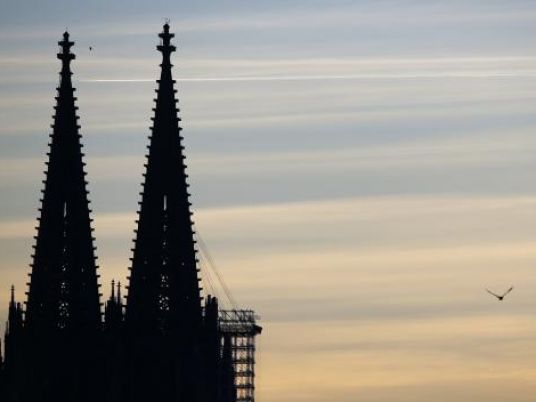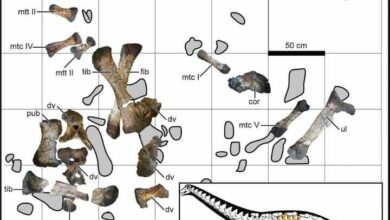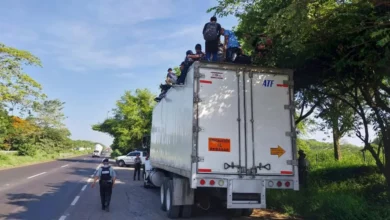
The crowds of drunk young men had been gathering for hours outside the main railway station in Cologne on New Year's Eve when city police finally told the office that coordinates forces for the region that they wanted to clear the square.
The police coordinating office says it offered to send reinforcements. A report from the city police says the officer in charge decided there was no point asking for help because reinforcements would arrive too late.
Cologne, a city of more than 1 million people, had added just 142 extra police for the holiday. Most had only come on duty at 10:00 p.m.
As every German now knows, the small police force would prove incapable of preventing the crowd on that square from committing hundreds of assaults on women, stealing their valuables, groping and even raping them.
The incidents have caused profound soul searching in a country that allowed in an unprecedented 1.1 million migrants last year in what its leaders described as an act of historic generosity toward refugees.
Germans, who have prided themselves for generations in an orderly society that requires only gentle policing, are beginning to come to terms with change on a vast scale.
"In the past, the police's softly-softly approach and focus on de-escalation was cherished. But there have been warning signs in recent years that this may not be appropriate now," said Wolfgang Bosbach, a lawmaker from Chancellor Angela Merkel's Christian Democratic Union (CDU) whose constituency is near Cologne.
Cologne prosecutors say 945 complaints have been made to police over the events of that night, including 434 for sex crimes.
Four weeks on, prosecutors have 35 suspects, mostly for pick pocketing and robbery while just three are suspected of sexual crimes. Only nine of the suspects are in custody. Most of the suspects come from northern Africa – Morocco, Algeria or Tunisia.
One of the victims, Henrike, 18, told Reuters she was pestered, groped and sexually assaulted by a group of young men of north African appearance outside the station when she went to watch the city's firework display.
She feared she was going to be raped when a group of about 25 men encircled her and two friends and tried to pull down their skirts: "They were like animals … It felt like 20,000 hands were touching me all at once," she said.
German media reported similar sex attacks and robberies on a smaller scale in 12 of Germany's 16 states.
"The Europe we wish for"
It wasn't what politicians promised last year. When hundreds of thousands of migrants were arriving in the European Union last year on the shores of Italy and Greece, Germany made a bold decision: all refugees from the civil war in Syria would be welcome, regardless of where or how they entered the EU.
Chancellor Angela Merkel said Germany was a rich country that could afford to do its part to take in some of the world's most vulnerable people fleeing war.
"If Europe fails on the question of refugees … then it won't be the Europe we wish for," said Merkel in August.
But refugees were not the only people who arrived. In addition to thousands of families fleeing Syria and other war zones, Germany also let in hundreds of thousands of people from other countries with no valid claim for asylum.
The behavior of the groups has been starkly different. The Syrian refugees intentionally welcomed by Merkel have so far proven overwhelmingly law abiding. According to a Jan. 8 police report from North Rhine-Westphalia, the western German state that includes Cologne, only 0.5 percent of Syrian migrants in the city were caught committing crimes within a year.
By contrast, among migrants from North Africa, as many as 40 percent were caught committing crimes within a year, the report says.
Virtually none of the North Africans arriving in Germany have proven to be genuine refugees: last year Germany granted some form of protection to just 0.19 percent of Tunisian migrants, 3.74 percent of Moroccans and 1.6 percent of Algerians.
Many arrive not as families, but as single young men who are not legally permitted to work. Slightly more than twice as many males as females claimed asylum in Germany last year.
"What we experienced at New Year was not only a police problem – it is (a result of) a lack of integration of about 300,000-500,000 young men who have arrived without families in Germany and are sitting around without much to do and who come from a male-dominated culture," said Christian Pfeiffer, a criminologist and former justice minister of Lower Saxony state from the center-left Social Democrats (SPD).
Ingo Westen, vice-president of the German Moroccan society based in Dortmund an hour's drive from Cologne, said young North African men arrive with high hopes for lives in "paradise" but quickly become disillusioned by life with just a bed and a small stipend.
"That easily results in people who are not particularly strong getting corrupted by ringleaders who say: 'let's rob the department store over there or steal a mobile phone or clothes, and then we'll have a little bit of money when we sell them.'"
His organization worries that longer-settled migrants who have long been integrated into German society are increasingly falling under blanket suspicion too. It called for the German government to declare North African countries like Morocco to be safe and rigorously deport people who commit crimes.
Fewer security cameras than a grocery store
Police unions say their forces are simply not adequately staffed and funded for the changing environment. What happened in Cologne was "a result of the savings that have destroyed the police in the last 10 years," said Arnold Plickert, deputy chairman of the GdP police union.
The number of officers in the federal, state and criminal police has been cut by around 13,000 since 2000 to 260,713, according to the latest figures from GdP, although some federal states, including NRW are now boosting recruitment again.
A survey by regional newspaper Rheinische Post showed NRW has one of the lowest ratios of police officers to inhabitants of all of Germany's states, with 228 police offers per 100,000 residents compared with the national average of 304. France, by comparison, has 356.
Sebastian Fiedler, head of NRW's branch of the BDK union for Germany's criminal police, made up of plain-clothes officers that investigate crimes, said officers had been worried about offenses committed by north Africans for some time.
"But to combat such a criminal phenomenon we need sufficient qualified staff to investigate the gang structures and then destroy them … And that's where we have a problem," he said.
In part because of its totalitarian history, Germany has been reluctant to deploy the police surveillance tools used in other European countries. Police cameras, ubiquitous in, say, Britain or France, are virtually unseen, and none were on the square outside Cologne station.
NRW state police operate only two cameras in the entire state of 18 million people, and neither of them is in the city of Cologne, according to Erich Rettinghaus, head of the NRW branch of the DPolG police union.
"The concentration of cameras in a Lidl store is greater than that of the NRW police," he said, of a grocery chain.
Cologne – with a longer history of a migrant population than many other German cities – sees itself as a tolerant liberal city. Around a third of its population has a migrant background.
Still, the New Year's events were beyond anything police could imagine: "We only knew about sexual attacks on this scale from abroad, from places like Tahrir Square and India. But it had never happened in Germany before," Fiedler said.
In a Jan. 8 report, Cologne police said there had been no indications that such a high number of "dangerous people" would gather, and there had been no need for special police measures in the area around the cathedral and station in previous years.
Police in NRW say they have been studying crime among north Africans. In Duesseldorf, NRW's state capital, police are doing a study known as "Casablanca" looking into groups that carry out robberies using a technique called "Antanzen", in which criminals dance up to or hug victims to distract them before picking their pockets.
A police project in Cologne called NAFRI has been exploring the workings of possible groups of North African criminals since Jan. 2013. Three analysts have analyzed data on more than 21,000 criminal offences and 17,000 people of northern African origin.
But NRW state Interior Minister Ralf Jaeger said the suspects from New Year's Eve were not part of the Antanzen scene. In a report dated Jan. 19, the NRW interior ministry said of the 29 New Year's Eve suspects just one had turned up as part of the NAFRI project.
Hard questions
In the wake of the Cologne assaults, Germans have been forced to confront questions that some politicians say were deliberately buried last year while migrants poured in.
The reluctance to confront the issue has itself become part of the debate. Public broadcaster ZDF apologized for initially failing to report the New Year's Eve assaults. There was widespread criticism of the Cologne police for saying on Jan. 1 that the New Year's Eve celebration had been peaceful.
Gregor Golland, an NRW state lawmaker from Merkel's CDU, said the state government, led by the Greens and SPD, "more or less laughed" at his party's attempts to get the problem of north African criminals on the agenda in 2014 and 2015. "They acted as if it did not exist," he said.
Hans-Willi Koerfges, an SPD lawmaker in NRW's parliament, denied his party had ignored the Antanzen phenomenon among north Africans, saying SPD members had expressed concern and it was already being looked into by the time the CDU raised it.
A consensus is growing that, in order to make Merkel's generosity to refugees work, Germany is going to have to do more to distinguish between those genuinely in need of protection and migrants from safe countries. Merkel's coalition government backed a new law this week to make it easier to deport migrants who commit crimes.
Former German interior minister Hans-Peter Friedrich, of Merkel's CDU, said whitewashing by the media and politicians keeping quiet about problems related to the refugee crisis had "led to an illusion about an idyllic world that never existed".
"Now Germany is getting closer to reality," he added.




